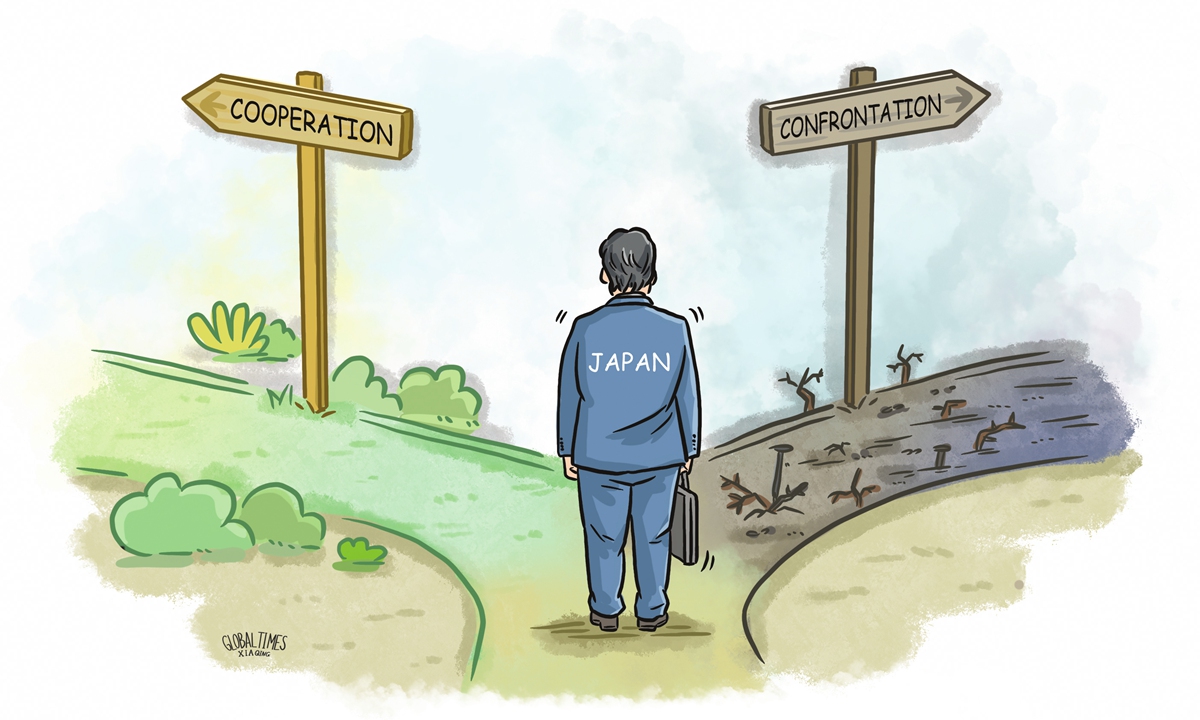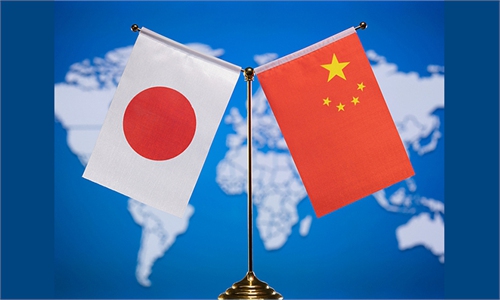
Illustration: Xia Qing/GT
Toshihiro Nikai, a veteran politician who is dubbed "a bridge to China" by Japanese media and chairman of the Japan-China Friendship Parliamentarians' Union, is leading a cross-party group of lawmakers for a three-day visit in Beijing.The delegation of 10, including Hiroshi Moriyama, chief of the general council of LDP, and Yuko Obuchi, chair of the LDP's election strategy committee, marks the group's first visit to China since 2019. During their stay, they held talks with China's high-ranking officials over pending bilateral issues.
In recent years, China-Japan relations have been tense due to various factors, reaching a low point in public sentiment between the two countries since diplomatic relations were established. This has hindered the normal advancement of bilateral ties.
Problems between the two countries have also "piled up," leading to more concerns. Japan's provocative actions in the East China Sea and South China Sea, which challenge China's core interests, as well as its alignment with the US that destabilizes the region, have become a source of concern for China.
Before the upcoming LDP presidential election, Japan's relationship with China has been under the spotlight. Japanese politicians are concerned that a further deteriorating China-Japan relationship could shock Japan's economy and politics, damaging Japan's national interests.
Nikai is known in Japan as a "China hand," having led several delegations to China and met with China's top leaders. His current visit is primarily aimed at communicating with China and exploring ways to ease the tensions between the two countries. There is hope from Japan that this visit will resolve disputes between the two countries and promote government-level dialogue.
It's without a doubt that the delegation's attitude toward China is pragmatic and sincere. The Chinese government has responded with high praise and warm hospitality.
However, it remains to be seen whether this visit can fundamentally improve China-Japan relations or to what extent improvement can be achieved. The key factor will be whether the new Japanese government will objectively and comprehensively recognize the importance of the bilateral relationship and implement friendly policies toward China.
Although Nikai is a prominent "China hand" figure in Japan with significant influence, the 85-year-old is now stepping back from politics.
The lack of understanding and friendliness among Japanese politicians toward China may impact future high-level exchanges and the trajectory of relations between the two countries.
Moreover, the current political atmosphere in Japan shows a clear trend toward following the US to counter China, as reflected in Japan's 2024 defense white paper.
The annual white paper approved by the Japanese Cabinet on July 12 labeled China again as Japan's "greatest strategic challenge," and for the first time warned that "China's increasing military activities" may escalate tensions across the Taiwan Straits.
China's Ministry of National Defense criticized the white paper, accusing it of using China as a pretext to deceive the Japanese public and mislead the international community, thereby justifying Japan's military expansion.
China and Japan are not only neighbors but also major powers with significant influence in the region and the world. The two countries enjoy a solid foundation for cooperation in trade and economy, and have consensus and cooperation potential on climate change, environmental governance and addressing an aging society.
If both sides can work together, particularly by reconstructing high-level dialogue, there is potential for easing current tensions, benefiting both peoples and contributing positively to regional and global peace and development.
Relying solely on "China hand" figures like Nikai is not enough. If the Japanese government still hesitates to make a formal gesture to improve relations, only limited improvements can be expected.
At this critical and sensitive moment, the visit of the Japan-China Friendship Parliamentarians' Union and its pragmatic stance are important and meaningful.
It is hoped that the Japanese government, especially the upcoming new cabinet, will follow up the effort made by the Union, by accurately, objectively and comprehensively understanding China, and adopting friendly policies toward China.
Japan should work with China to further advance bilateral relations toward a stable and constructive strategic relationship of mutual benefit in line with the requirements of the new era, and finally achieve friendly win-win cooperation between the two countries.
The author is a scholar of international politics and China-Japan relations, College of Foreign Languages, University of Shanghai for Science and Technology. opinion@globaltimes.com.cn


